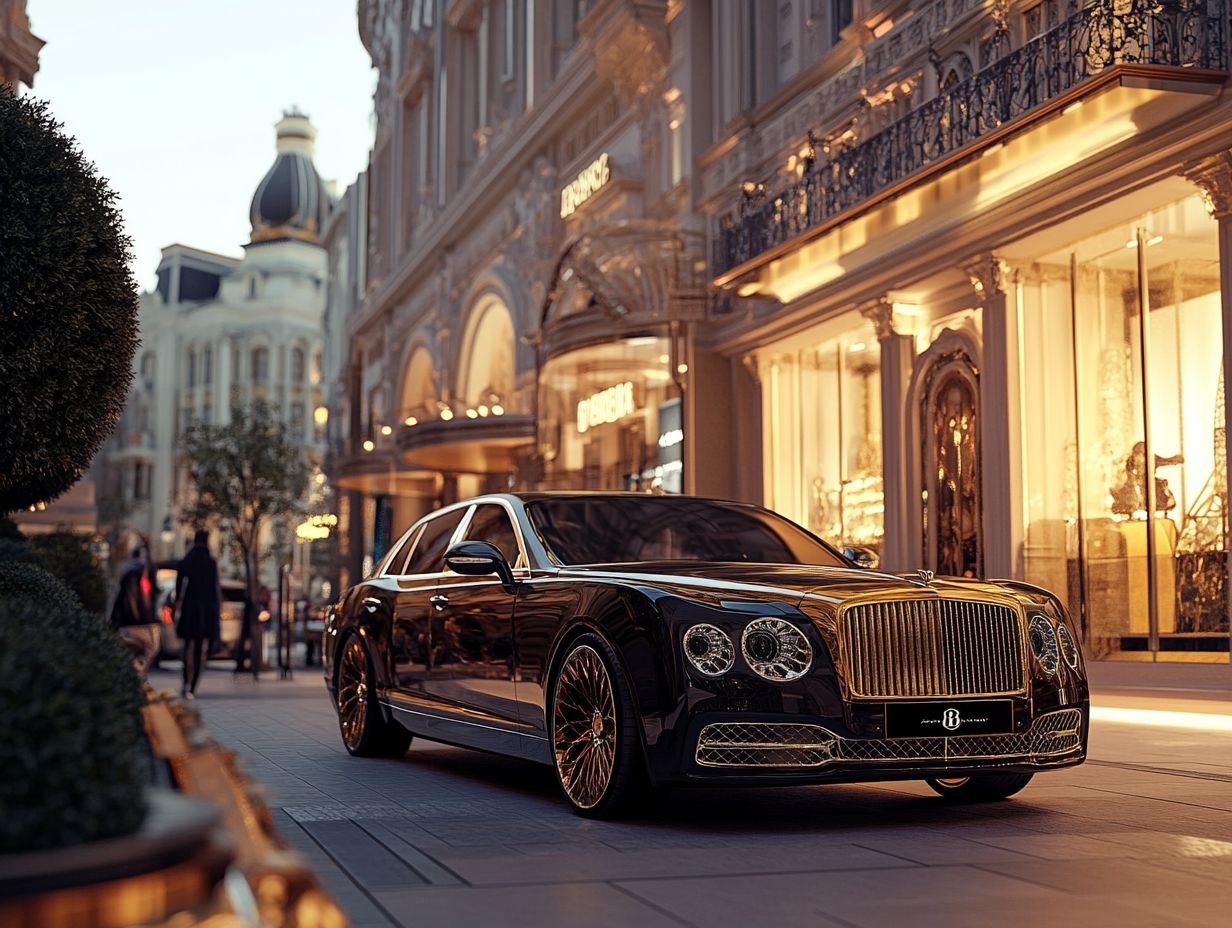Luxury Cars: Status Symbol or Financial Burden?
Luxury cars are often viewed as the ultimate symbols of status and success, but have you ever thought about what really defines them?
These vehicles represent wealth, coming with not just a hefty price tag but also a whole range of perceptions and social implications. Owning a luxury car means you’re also dealing with hidden costs and long-term financial commitments that can surprise you.
This article dives into the allure of luxury cars, the financial realities that come with them, and some key factors you should consider before making such a significant investment.
What Defines a Luxury Car?

Luxury cars are usually all about exceptional performance, unique design, and remarkable engineering that really sets them apart in the automotive market. When you drive one of these high-end vehicles, you’re not just enjoying superior comfort and performance; you’re also embracing a sense of prestige and exclusivity that speaks to a more affluent lifestyle.
The artistry in their design is something to appreciate, too. With sleek lines, premium materials, and a keen attention to detail, these cars create an aesthetic appeal that you just won’t find in mass-market vehicles. Plus, the advanced technology packed into these automobiles takes safety and driving experience to the next level.
Think adaptive cruise control, smart navigation systems, and state-of-the-art infotainment options.
This blend of luxury features and top-notch engineering resonates with you on a deeper level. It creates an emotional connection that goes beyond just functionality, influencing your choices in the automotive marketplace and helping to build strong brand loyalty among those who truly appreciate the finer things in life.
The Status Symbol of Luxury Cars
Luxury cars have always been seen as status symbols, showcasing wealth and prestige in society.
When you own a high-end vehicle, it’s not just about getting from point A to B; it’s about making a statement about your social status and image. It speaks volumes about your lifestyle choices and personal values.
The charm of owning a luxury car draws in affluent consumers and enthusiasts alike, as these vehicles offer a unique mix of performance, comfort, and that emotional appeal that keeps you loyal to a brand while boosting its reputation in the competitive automotive market.
Perceptions and Social Significance

The way people perceive luxury cars is closely tied to their social significance, which often affects how you behave as a consumer and what you aspire to. For many, owning a luxury vehicle isn’t just about the thrill of the drive; it’s a badge of social mobility and an elevated identity that helps ease status anxiety, especially among high-net-worth individuals.
As the luxury market keeps expanding, the desire for aspirational purchases shapes how you view these brands, making them symbols of wealth and success.
This creates a ripple effect across various sectors, as more and more people see these vehicles as extensions of their personal identity, showcasing their values and lifestyle choices. This trend also pushes automobile manufacturers to adapt their strategies, catering to your evolving desires while emphasizing the symbolic role luxury cars play in signaling status.
As a result, these vehicles often become vital assets in social interactions, where owning one can enhance your reputation and influence, ultimately shaping your personal narrative and altering how others perceive you within social hierarchies.
The Financial Burden of Luxury Cars
Luxury cars definitely deliver unmatched performance and comfort, but they also bring a hefty financial commitment that might make you think twice.
It’s not just the high price tag; the costs of ownership can pile up fast. Think about maintenance, insurance premiums, and depreciation that can hit hard when it’s time to resell.
For those with a taste for the finer things, it’s essential to grasp these financial realities. Doing so will help you with your financial planning and ensure that your investment fits your lifestyle choices and long-term goals.
Costs and Hidden Expenses

When you’re thinking about luxury cars, it’s crucial to consider not just the upfront costs but also those sneaky hidden expenses that can really impact your overall ownership costs.
Luxury car depreciation rates can take quite a dive, so you’ll want to factor in maintenance costs and insurance premiums, which tend to be higher for those high-end rides. Exploring your financing options and getting a grip on what you can afford can really help ease the financial strain and make your ownership experience enjoyable.
On top of that, keep in mind that many luxury models need specialized service and parts, which can lead to some hefty maintenance bills. Insurance companies often see luxury vehicles as high-risk investments, and that can translate to premiums that are much higher than what you’d pay for a standard car.
Don’t forget to consider the costs of luxury accessories, detailing, and any warranties you might want. They can definitely add to your total expenses.
Ultimately, having a solid understanding of these financial implications is key if you’re eyeing a luxury car. You want to make sure your dream vehicle doesn’t turn into a financial headache.
Alternatives to Owning a Luxury Car
If you’ve got your eye on luxury cars but feel a bit hesitant about the financial hit or long-term commitment, leasing and car sharing could be your best friends. These options let you dive into the high-end vehicle experience without all the ownership headaches, making it easier for you to maintain that luxe lifestyle you’re after.
With the way economic conditions and changing consumer preferences are shaping the scene, people are starting to see luxury cars more as cool status symbols rather than just aspirational purchases.
Leasing is a fantastic way for you to cruise around in a brand-new luxury ride without breaking the bank on monthly payments. Plus, it means you can always be behind the wheel of the latest models, which is pretty sweet.
On the other hand, car-sharing services let you access a luxury vehicle on-demand, so you can enjoy that special ride whenever you want—perfect if you value convenience and the occasional indulgence.
And let’s not forget about rental services. They’re perfect for special occasions or business needs, giving you that taste of luxury without any long-term strings attached.
All of these options show how consumer behavior is changing, with practicality and economic factors playing a big role in the decision-making process. By focusing more on experiences rather than ownership, living that luxurious lifestyle has never been more within reach.
Factors to Consider Before Purchasing a Luxury Car

Before you jump into the luxury car market, it’s important to think about a few key factors that can really impact your purchase decision and your experience as an owner.
First off, your personal finances will play a big role in figuring out what you can actually afford. You’ll want to pay attention to the long-term value and resale potential of luxury vehicles to help protect your investment.
Plus, take a moment to reflect on your lifestyle and how it aligns with the driving experience you’re after. This self-reflection will guide you in making a decision that boosts your satisfaction as a luxury car owner.
Personal Finances and Lifestyle
Understanding your personal finances is crucial when you’re thinking about buying a luxury car, as it directly affects your ability to enjoy that lavish lifestyle you’ve got your eye on. Balancing what you can afford with your desire for those high-end vehicles takes some careful financial planning and a good understanding of your monthly expenses and long-term goals.
Recognizing the importance of budgeting and saving can really help you prioritize your spending. This way, you can treat yourself to the finer things in life without putting your financial stability on the line. The thought of owning a luxury vehicle brings to mind dreams of sophistication and prestige, but it’s super important to analyze how that investment fits into your overall financial strategy.
Looking at ongoing costs like insurance, maintenance, and fuel can help you determine whether committing to luxury car ownership is truly feasible or just an enticing daydream.
In the end, taking charge of your personal finances not only give the power tos you to make informed purchasing decisions but also boosts your overall satisfaction with the luxuries you choose to indulge in.
Long-Term Value and Resale Potential
When you’re thinking about investing in a luxury car, it’s super important to understand its long-term value and resale potential. After all, you want to get the most out of your investment.
Luxury car depreciation rates can differ quite a bit between brands, which can impact how much you’ll get back when it’s time to sell or trade it in. By keeping an eye on market trends and the reputation of the brand, you can make smart choices that help your investment hold its value over time.
This mindset matters because some vehicles are known to retain their worth much better than others, thanks to their craftsmanship, popularity, and how many were made.
Car enthusiasts often hunt for models that have strong collectible appeal or are linked to a prestigious legacy, making them more desirable in the second-hand market. Plus, features like advanced technology and unique design can really help maintain the value of a luxury car.
So, as a prospective buyer, it’s wise to do your homework and chat with industry experts. This way, you can navigate the tricky waters of depreciation and make sure your investment fits both your lifestyle and financial goals.





